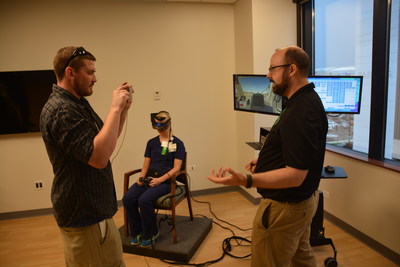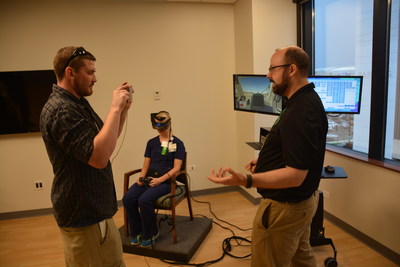Innovative Partnership Helps Veterans with PTSD
JACKSONVILLE, Fla., Aug. 26, 2016 /PRNewswire-USNewswire/ -- There was a time when Bill Geiger overreacted far too often – and he's the first to admit it.

"I exploded when the anger got to be too much for me," the Army veteran said. "Even a small event would set me off into a tailspin of depression."
That was before Bill enrolled in Warrior Care Network™, a partnership between Wounded Warrior Project® (WWP) and four top academic medical centers around the country. Warrior Care Network provides intense outpatient programs for warriors struggling with post-traumatic stress disorder (PTSD), traumatic brain injury (TBI), and other mental health conditions, all at no cost to the warrior or their family. The innovative collaboration tailors mental health care to wounded veterans, leading them to new methods to cope with challenges.
Bill experienced his life-changing care at Home Base, a Red Sox Foundation and Massachusetts General Hospital Program.
Matt Barnes dealt with similar struggles as Bill before discovering Warrior Care Network and the Emory Healthcare Veterans Program.
"My PTSD was too bad, and I didn't even realize it," Matt said. "I didn't like new people; I didn't like crowds. I pretty much isolated myself."
Angry outbursts and isolation are two common symptoms of PTSD as an individual copes with triggers or stressors. One of the ways Warrior Care Network helps is to ensure wounded veterans not only understand these triggers, but also finds ways to manage their situation. Home Base, a Red Sox Foundation and Massachusetts General Hospital Program, the Emory Healthcare Veterans Program, Operation Mend at UCLA Health, and Road Home at Rush University Medical Center provide techniques to cope. The treatment can be grueling.
"It was harder than going through boot camp," Matt said. "But it helped so much."
WWP launched Warrior Care Network one year ago after surveying wounded veterans and seeing PTSD needs increasing among warriors. The annual WWP Alumni Survey showed more than 76 percent of veterans surveyed deal with a traumatic experience from battle.
"These programs reach veterans where they are and help the men and women feel like themselves again," said Mike Richardson, WWP executive vice president of independence services and mental health. "They protected our way of life; now we're here to help them thrive in theirs."
Wounded veterans may spend two to three weeks at the medical center and in some cases the veteran is accompanied by their loved one. They go through individual sessions, group healing, and other treatments like dialectical behavior therapy -- think of it as learning life skills to cope with PTSD. Warrior Care Network partners also use innovative technology to help in the care, including virtual reality to help immerse warriors in their recovery by reliving the triggers associated with their trauma.
"There are unique challenges that the veteran population faces in seeking and obtaining mental health care," says Michael B. Brennan, PsyD, the Rush University Medical Center Road Home Program's associate clinical director and a captain in the Army Reserve. "Warrior Care Network's intensive outpatient program meets that need."
Warrior Care Network works with the Department of Veterans Affairs (VA) to ensure continual care for these men and women. Through sharing information, warriors can more seamlessly transition from VA care to Warrior Care Network, and back into the VA system.
"When I came home from Warrior Care Network, doctors let me know they are just a phone call or email away," Bill said. "They also helped me identify doctors in my area that can help with follow-up care."
Intense, impactful, mental health care, available for today's generation of wounded veterans with just a phone call (888.WWP.ALUM) or the click of a mouse (https://www.woundedwarriorproject.org/programs/warrior-care-network)
"My family and friends notice a difference in me," Bill said. "I still have struggles, but I now have the knowledge and tools to better handle situations."
"I feel like my old self," Matt said. "I'm out of the house as much as possible. My family and employer have noticed a change. This program gave me my life back."
About Wounded Warrior Project
The mission of Wounded Warrior Project® (WWP) is to honor and empower Wounded Warriors. WWP's purpose is to raise awareness and to enlist the public's aid for the needs of injured service members, to help injured servicemen and women aid and assist each other, and to provide unique, direct programs and services to meet their needs. WWP is a national, nonpartisan organization headquartered in Jacksonville, Florida. To get involved and learn more, visit woundedwarriorproject.org.

Photo - http://photos.prnewswire.com/prnh/20160826/401707
Photo - http://photos.prnewswire.com/prnh/20160826/401706
SOURCE Wounded Warrior Project

